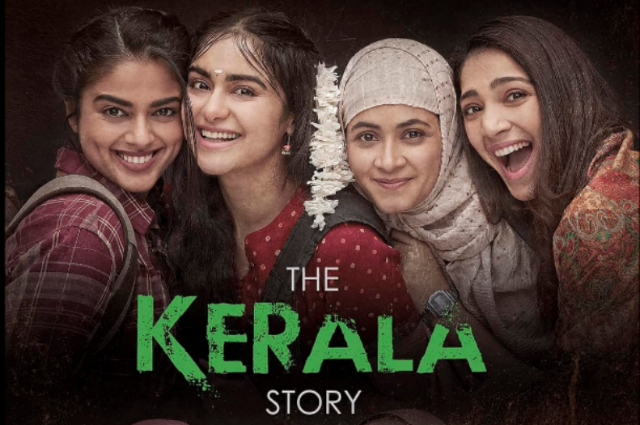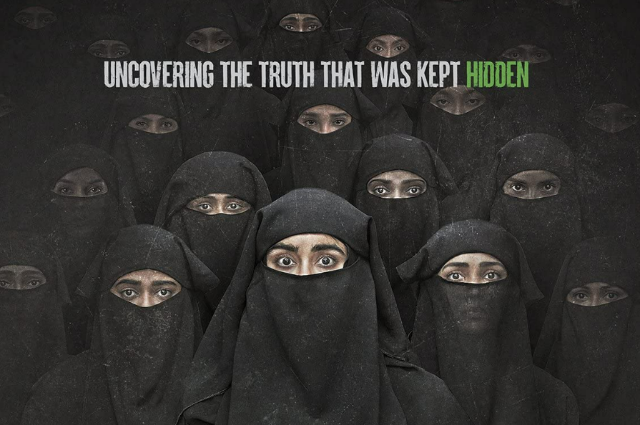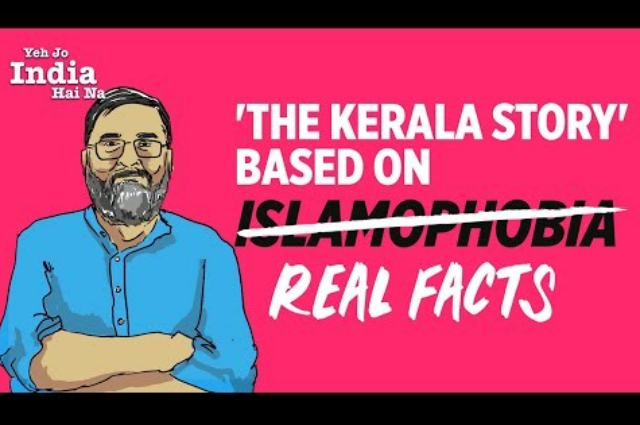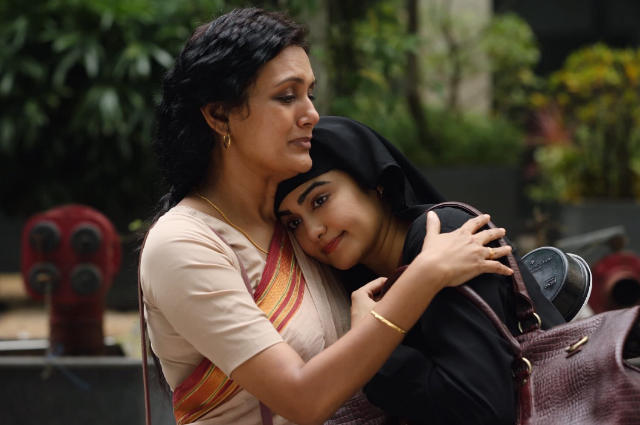In the depths of Kerala's intriguing tales, a haunting chronicle emerges - "The Kerala Story." Within its pages lie the accounts of three young girls, their lives entwined by destiny, and their dreams shattered by an unforgiving reality. At the heart of this gripping narrative stands Shalini, a symbol of resilience and tragedy. In "The Kerala Story," we embark on a journey that unearths the chilling truths of abduction, conversion, and the perilous path of radicalization. Brace yourself as we delve into the darkness and unveil the intricate layers of this harrowing tale, where innocence is stolen, identities are reshaped, and lives are forever altered.
The Cinematic Storm Surrounding the Release of 'The Kerala Story
The release of the film "The Kerala Story" has ignited a fervent debate, reminiscent of the contentious discussions surrounding "The Kashmir Files." Once again, the battleground of freedom of speech is being tested, challenging the willingness of partisans to embrace diverse perspectives. In a peculiar twist, those who previously rallied behind films that provoked right-wing backlash are now decrying "The Kerala Story" as a tool of propaganda and defamation. Across social media platforms and even in mainstream media, outrage and vindication collide, creating a volatile atmosphere. This latest controversy serves as a stark reminder of the deep divisions within society and the polarizing power of cinematic narratives. As the storm rages on, the fundamental principles of free expression and the capacity to engage with dissenting viewpoints hang in the balance.
The subject matter of "The Kerala Story," which delves into the activities of radical organizations like the banned Popular Front of India (PFI) and the controversial preacher Zakir Naik's Islamic Research Foundation, has propelled it into the heart of the political discourse. Not surprisingly, the film has swiftly become a focal point in the ongoing debates. Some states governed by the Bharatiya Janata Party (BJP) have even granted it tax exemption, while Uttar Pradesh Chief Minister Yogi Adityanath has personally met with the production team and intends to watch the film alongside his ministerial colleagues. On the other hand, West Bengal Chief Minister Mamata Banerjee has taken the opposite stance, banning the film in the state. Citing concerns over maintaining harmony and law and order, she argues that the screening of the film could potentially lead to undesirable consequences. The polarized reactions to "The Kerala Story" highlight the inherent power of cinema to influence public opinion and ignite contentious discussions with wide-ranging implications.
Before delving deeper into the controversies and political discourse surrounding 'The Kerala Story,' let's first embark on a journey through the film's captivating narrative, which sheds light on the intertwined lives of three young girls and their encounters with abduction, conversion, and the perilous path of radicalization.
Exploring the Turbulent Journey of 'The Kerala Story’
"The Kerala Story" revolves around the alleged radicalization and conversion of young Hindu women to Islam in Kerala, leading them to join ISIS. The film follows the journey of Shalini, one of the three girls at the center of the story. Set in a Nursing School in Kasargauda, Kerala, the narrative unfolds through Shalini's perspective. Unbeknownst to her and her roommates, Asifa, one of the girls, has a secret agenda to expose and convert them to Islam. With the help of male associates, the girls are gradually radicalized and indoctrinated using drugs. As the story progresses, Shalini becomes pregnant, forced into an unwanted marriage, and embarks on a dangerous journey to Syria via Pakistan and Afghanistan.
The film portrays the emotional turmoil faced by Shalini, played powerfully by Adah Sharma, as she transforms into Fatima and faces the harsh realities of her circumstances. Director Sudipto Sen tackles a sensitive and complex subject matter with a mix of disturbing scenes, moments, and dialogues. While the treatment of the film captures the uneasiness and challenges of dealing with such themes, some scenes may be difficult to watch. The cinematography by Prasantanu Mohaptra effectively captures the locations, particularly the border regions of Afghanistan-Pakistan.
However, the background score falls short, overpowering the narrative at times. The hostel scenes featuring the girls are well-executed, but there are moments that feel dull and uninteresting, particularly during Asifa's attempts to brainwash and radicalize Shalini. The film aims to provoke thought and raise questions about the current state of the country, but it may go to extremes in making its point, which can be unsettling for viewers from different communities.
In summary, "The Kerala Story" is a thought-provoking and disturbing film that sheds light on the sensitive subject of radicalization. It leaves a lasting impact on the audience, but viewers should approach it with caution due to its intense and unsettling content.
Unmasking 'The Kerala Story': Propaganda or Concealment of Truth?
The release of the movie 'The Kerala Story' has been mired in controversy as some individuals and groups label it as propaganda, attempting to conceal the harsh realities depicted in the film. Critics argue that certain factions wish to suppress the truth and prevent a thorough examination of the facts. They claim that the film is being exploited for political gains, particularly during elections, and that bans are being imposed in specific cities and regions to hide the truth.
By dismissing the film as mere propaganda, these voices seek to undermine the authenticity and credibility of the narrative presented. They raise concerns about the suppression of uncomfortable truths and the manipulation of public opinion for vested interests.
It is essential to acknowledge the significance of the details portrayed in the movie. 'The Kerala Story' sheds light on compelling facts and unveils a narrative that some may find inconvenient or uncomfortable to confront. By attempting to silence the film and prevent its dissemination, certain entities are impeding the search for truth and hindering an honest exploration of the depicted events.
The decision to ban the movie in specific cities and regions raises questions about the motivations behind such actions. Are these bans driven by a genuine concern for maintaining peace and order, or are they part of a larger effort to suppress the truth and control the narrative?
In the face of these controversies, it is crucial to safeguard the freedom of expression and the right to explore challenging subjects through artistic mediums. Open and honest dialogue should be encouraged, allowing for a deeper understanding of the issues at hand and promoting a more informed and enlightened society.
It is only by embracing diverse perspectives and engaging in critical discussions that we can uncover the truth and foster an environment where the voices of those affected by these realities can be heard. The controversy surrounding 'The Kerala Story' serves as a stark reminder of the importance of truth-seeking and the need to challenge narratives that seek to hide or manipulate the realities we face.
For those dismissing the film as mere propaganda, it is imperative to delve into the harsh reality of what is happening not only in the world but also within our own cities in India.
You might be wondering if this is just a fictional tale, but let me reveal the unsettling reality of how it actually works.
Separating Fact from Fiction: Unveiling the Realities of Manipulation and Radicalization
The process of radicalization involves several steps aimed at manipulating and indoctrinating individuals into extremist ideologies.
First, radical influencers often start by questioning you. They may ask thought-provoking questions that challenge your existing beliefs and create a sense of confusion. This tactic is designed to make you question your faith and become more receptive to alternative perspectives.
As the confusion sets in, the radical influencer take advantage of your vulnerable state. They begin criticizing your religion, including your deities and practices. This relentless criticism aims to undermine your faith and create a sense of disillusionment.
At this stage, recruiters\radical influencer may offer you books, such as translations of the Quran known as “Tafsir”, and share videos featuring influential figures like Zakir Naik, MM Akbar, and others. These materials are carefully selected to reinforce extremist ideologies and further sway your beliefs.
Gradually, you may find yourself becoming more interested in the materials and ideas presented to you. The recruiters capitalize on this curiosity and provide you with more content, drawing you deeper into their ideological web.
By preying on their vulnerabilities, they cunningly implant the belief that deviating from their prescribed path will lead to dire consequences. These recruiters, invoking the authority of Allah, instill fear by warning that straying from their extremist ideology will condemn the individual to an eternity in hell, subjected to the wrathful punishment of a higher power. This psychological manipulation exploits the innate human instinct for self-preservation, coercing individuals into submission and obedience. The chilling prospect of divine retribution becomes a powerful tool, driving the unsuspecting victims deeper into the clutches of radicalization.
During this process, your relationship with your family may also be affected. Manipulated by the extremist rhetoric, you may begin viewing your parents, who follow a different faith, as destined for damnation. The recruiters may convince you that your parents are "kafirs" and will face punishment in the afterlife.
It is crucial to recognize the tactics employed in this manipulation process. By exploiting vulnerability, sowing confusion, and offering alternative narratives, radical groups aim to reshape your worldview and steer you towards extremism.
In these cases, vulnerable individuals, often young women, are deliberately connected with Muslim men who utilize the guise of love to advance their extremist ideology.This technique is called “LOVE JIHAD” Under the pretext of affection and companionship, these men gradually introduce their victims to radical beliefs, coercing them into converting to Islam. This deceptive tactic exploits the emotions and trust of the individuals involved, as they are manipulated into embracing a new faith in the name of love. The disturbing reality of love jihad reveals how innocent individuals can be unwittingly used as instruments in a larger scheme of religious conversion and societal division.
Terrorism Unmasked: Portraying the Dark Realities Beyond Religious Labels
The film is often criticized for allegedly focusing on a particular religion. However, it is essential to understand that the film's primary emphasis lies on the theme of terrorism and its various facets. While it explores the backdrop of Islamic radicalization, it does not seek to portray an entire religion in a negative light. Instead, the film delves into the intricate workings of terrorism, shedding light on the manipulative tactics used by extremist groups to recruit vulnerable individuals. By highlighting these aspects, the film aims to raise awareness about the dangers of radicalization and the urgent need to address this global issue. It is crucial to differentiate between the portrayal of terrorism and the portrayal of an entire religion, as 'The Kerala Story' seeks to unravel the mechanisms of terrorism rather than promoting religious bias or stereotypes.
Certain individuals have been quick to spark controversies by linking the film to religion, thereby attempting to divert attention from the underlying truth it portrays. It is essential to clarify that the film does not target any specific religion, but rather sheds light on the harsh reality of terrorism and its impact on society. By deliberately shifting the focus to religious aspects, these individuals aim to conceal the core message and prevent a sincere exploration of the issues at hand. It is crucial to recognize that the film's objective is to reveal the truth and foster a deeper understanding of the complexities involved, rather than promote any form of religious bias or discrimination. By allowing such controversies to overshadow the film's intentions, we risk losing sight of the crucial conversations that need to be had to address the underlying problems and work towards a safer, more inclusive society.
Revealing the Facts Behind 'The Kerala Story'
The film’s most controversial claim thus far has been that approximately 32,000 girls have gone ‘missing’ from the southern state, allegedly after being forcefully/deceitfully converted to Islam and then recruited by the Islamic State.
Director Sudipto Sen has stated that he has evidence to support this claim, although he has not publicly shared it thus far. In an interview, Sen mentioned that a report tabled by former chief minister Oommen Chandy in the Kerala Assembly indicated that approximately 2,800 to 3,200 girls were being converted to Islam each year. By calculating this number over a ten-year period, it arrives at the figure of 32,000 to 33,000 girls, which is quoted in the film. Sen asserts that Chandy denied these figures when questioned, but he claims to possess the necessary documentation to support his claim.
Another significant claim made in the film is that these converted girls not only underwent a change of faith but also became 'missing' and were allegedly recruited by the Islamic State to serve as jihadi fighters. The Islamic State has long considered India as part of its target for establishing the "Khorasan Caliphate." Reports from Syria in 2013 first alerted Indian intelligence agencies to the presence of Indians among the ranks of IS fighters. Since then, a number of individuals from India have traveled to Iraq and Syria to join the IS, with approximately 100 individuals arrested by Indian agencies upon their return or while preparing to join the terrorist group. Several others have also been apprehended for planning attacks within India, inspired by the ideologies propagated by the Islamic State.
In 2019, then Minister of State for Home Affairs G Kishan Reddy told Parliament in a written reply that “the National Investigation Agency (NIA) and the state police forces have registered cases against ISIS operatives and sympathisers, and have arrested 155 accused from across the country so far”.
A 2019 report by the Observer Research Foundation said, “India was thought of by analysts to be fertile ground for the recruitment of foreign fighters for the Islamic State (IS). The country, however, has proven such analysts wrong by having only a handful of pro-IS cases so far.”
Exploring the Societal Impact
The release of 'The Kerala Story' has sparked intense debates and discussions, not only within the realm of cinema but also in society at large. The film's depiction of abduction, conversion, and radicalization raises significant questions about the societal impact of such events. It forces us to confront the vulnerabilities that exist within our communities and the potential consequences of extremist ideologies taking root. The narrative presented in the film sheds light on the disturbing reality of individuals being lured into radical outfits and the subsequent impact on their families, communities, and society as a whole. It serves as a poignant reminder of the need for vigilance, awareness, and proactive measures to prevent the manipulation and exploitation of vulnerable individuals. 'The Kerala Story' acts as a mirror reflecting the complex dynamics at play, urging us to critically analyze the societal impact of such incidents and explore ways to foster resilience, unity, and harmony in the face of divisive ideologies.
Promoting Awareness and Understanding for a Safer Society
'The Kerala Story' serves as a wake-up call, reminding us of the pressing issues that our country faces regarding the alleged forced conversions and recruitment of girls. It is crucial for us to focus our attention on these matters and take proactive steps to address them. One of the fundamental aspects of tackling such challenges is raising awareness among the girls and young women in our country. It is essential to ensure that they are well-informed about the tactics employed by radical groups and the potential risks they may face.
This film provides a platform for dialogue and understanding, shedding light on the grim realities that some families have experienced. It calls upon all of us to watch and engage with the film, as it unveils the truth behind the narratives that are often hidden from public discourse. By watching 'The Kerala Story,' we can gain a deeper understanding of the complexities involved in the process of recruitment and the manipulation of vulnerable individuals.
To build a safer society, it is crucial that we come together, transcending religious and cultural boundaries, to address these issues collectively. By promoting awareness, empathy, and understanding, we can create an environment where our girls are empowered to make informed choices and are equipped to safeguard themselves against any form of exploitation.
'The Kerala Story' stands as a powerful testament to the need for comprehensive measures that safeguard the well-being of our society. Let us seize this opportunity to engage in meaningful discussions, support the victims, and work towards a future where no individual is coerced or manipulated. Together, we can strive for a society that is united, resilient, and inclusive, where truth and justice prevail.




